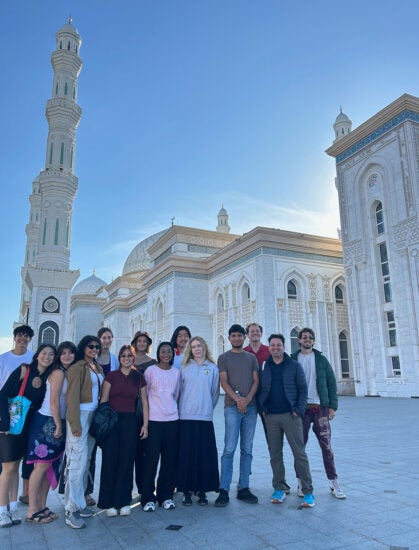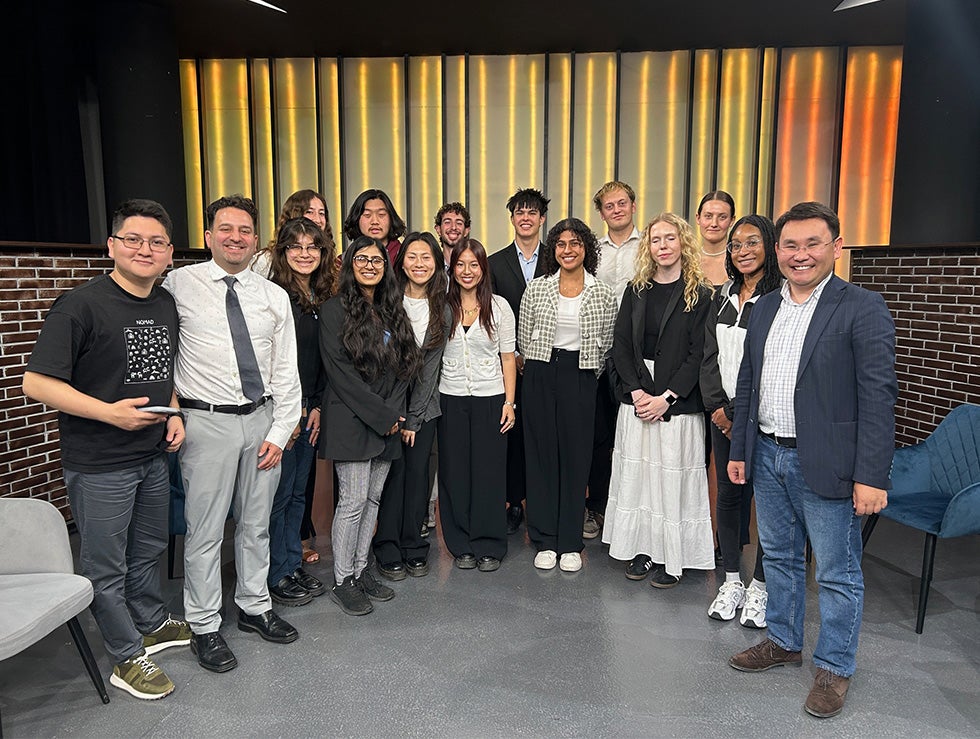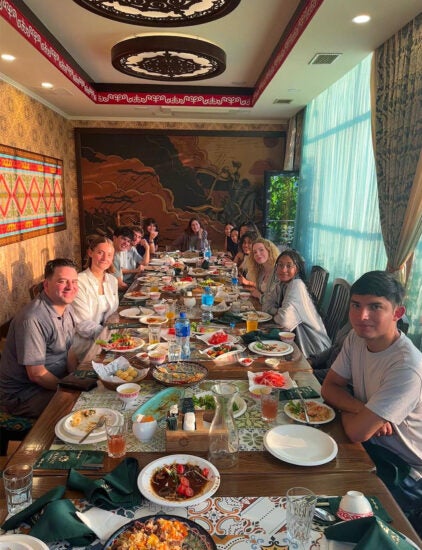
In Central Asia, students advocate for human rights amid geopolitical tensions
Central Asia, a region where the economic and geopolitical ambitions of global powers like China, Russia, Turkey, the European Union, the United States and India converge, includes the nations of Uzbekistan, Tajikistan, Turkmenistan, Kazakhstan and Kyrgyzstan. This resource-rich area has gained renewed global attention following Russia’s 2022 invasion of Ukraine.
This past summer, 15 students from the USC Dornsife College of Letters, Arts and Sciences embarked on a journey to Kazakhstan and Kyrgyzstan, transforming the region into their classroom.
“By partnering my talented students with some of the world’s most courageous, creative and experienced human rights defenders in this region, I hope to inspire them to see that a career in human rights is one of the most rewarding professional paths one can pursue,” said Steve Swerdlow, a human rights lawyer and associate professor of the practice of political science and international relations at USC Dornsife.

For many of the students, such as Radulf Mohika, the Maymester course — “Human Rights in Central Asia” (IR 422) — revealed the global importance of the region. “Before this program, I knew nothing about Central Asia. Now I see how Central Asia is vital to understanding Russia, Ukraine, and the lingering Soviet legacy,” said Mohika, a philosophy, politics, and law major with a double minor in law and social justice, and Latin American studies.
For others, like Joshua Pan, an international relations major, the experience stirred a deep, personal reaction. “As a Chinese Muslim, connecting with the local culture — from praying in mosques to trying different cuisines — was like being transported home to China.” Pan also was able to practice his Russian and Kyrgyz language skills.
At the center of geopolitical shifts
Students explored how Russia’s invasion of Ukraine has intensified authoritarianism in Kyrgyzstan, once the region’s most democratic nation. Since the war began, the number of human rights violations in Kyrgyzstan has accelerated. Their 2024 ‘Foreign Agents Law,’ for example, undermines the effectiveness of humanitarian nonprofits and stifles free speech.
Meanwhile, despite its vast oil reserves, Kazakhstan is balancing Russia’s imperialism with China’s growing economic influence, as China became its top trading partner in 2023.
Both Kyrgyzstan and Kazakhstan have imprisoned critics and journalists and suppressed non-governmental organizations (NGOs) addressing issues such as torture, environmental justice and domestic violence.
“Soviet methods — censorship, suppression of free speech, ethnic discrimination — persist today,” Mohika noted, drawing parallels between the past and present.
Human rights and power dynamics
Swerdlow developed the course as one of USC Dornsife’s Maymester programs. Drawing on his years of experience in the former Soviet Union as a Human Rights Watch and U.N. researcher, he sought to immerse students in research and human rights advocacy.
He facilitated meetings at embassies and NGOs, and with government officials, including Kyrgyzstan’s vice prime minister, Edil Baisalov, and Dastan Bekeshev, one the country’s most popular parliamentarians. USC Dornsife senior Sunny Cheng said she valued the opportunity to advocate for human rights but noted that Baisalov dodged tough questions about jailed reporters, steering the conversation to topics like the country’s Olympic prospects.
A meeting with journalists at Radio Free Europe in Kazakhstan and Kyrgyzstan inspired Morgan Kessler, a pre-law student interested in media and freedom of speech. “It gave me a real sense of the impact this service, subsidized by U.S. tax dollars, has for more than 2 million Kyrgyz listeners daily,” said Kessler, who is majoring in classics at USC Dornsife and global health at Keck School of Medicine of USC.
Pan said he was struck by the journalists’ nuanced understanding of global dynamics and how they help listeners develop media literacy in a region dominated by Russian state propaganda.

The human toll of advocacy
One of the students’ most sobering encounters occurred in Karakol, a village along the Tianshan mountain range, where they met with human rights defender Kamil Ruziev. Ruziev, an ethnic Uyghur, spent decades representing low-income ethnic minorities, survivors of domestic violence and victims of police torture in Kyrgyzstan, until he was targeted by the Karakol police department in 2019. Ruziev recounted how a police investigator made repeated death threats and even held a gun to his head. In 2022, after being falsely charged with forging documents, he was acquitted with help from international human rights organizations.
“One of the biggest lessons Ruziev conveyed,” Mohika said, “is that ending torture requires more than changing the culture of the law and the judges — it’s about changing the law itself.”
In Astana, Kazakhstan’s glitzy capital, the students became the first U.S. or foreign student delegation to visit Parliament. There, they met with Maya Kasymova, the head of the Human Rights Ombudsperson’s office, discussing issues about media freedom and women’s and LGBTQIA+ rights. Kessler learned that Kazakhstan’s increasingly restrictive legislation – especially around LGBTQIA+ rights – will exacerbate an already difficult environment and increase fear among human rights defenders. She and others said they came away with a deeper appreciation for the rights they enjoy in America and the importance of safeguarding them.
From the serious to the sublime

The class also immersed itself in Central Asia’s rich cultural heritage. A meal hosted by a Dungan family, Chinese-speaking Muslim minorities in eastern Kyrgyzstan, offered a glimpse into a community Cheng described as “warm and welcoming.” The cuisine provided students with a novel culinary experience, highlighting the region’s unique flavors and traditions.
In Kyrgyzstan, the students attended a private viewing of the traditional sport kok boru —- a game akin to polo but played with a goat’s carcass instead of a ball. Mohika found it “an enlightening experience,” while Cheng preferred the Kazakh ballet in Astana’s opera house, where the performance fused traditional Kazakh dance with classical ballet.
Hiking through the Ala Archa gorge near Bishkek, the capital of Kyrgyzstan, and swimming in the pristine waters of lake Issyk-Kul in eastern Kyrgyzstan provided a refreshing respite from their intense academic schedule.
Shaping the Future
The political dynamics of Kyrgyzstan and Kazakhstan, along with meetings with activists and officials, inspired several students to pursue a career involving human rights. Pan now aims to become a diplomat, while Mohika is weighing his options in diplomacy or at a think tank. Cheng is also exploring careers in diplomacy, and Kessler reaffirmed her plans to attend law school.
“There’s nothing better than watching my students quickly learn to hold their own in high-level advocacy meetings with the best of them,” said Swerdlow, who is preparing his 2025 Maymester to another complicated region: Armenia and Georgia.